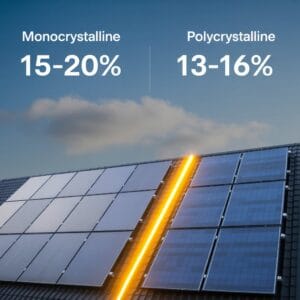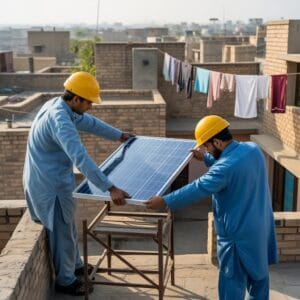As Pakistan continues to embrace renewable energy solutions, solar power has emerged as a top priority, offering homeowners and businesses a clean, sustainable, and cost-effective way to generate electricity. At the heart of a solar power system are the solar panels, which are responsible for converting the sun’s energy into usable electrical current. To ensure that you get the maximum power output and increased solar panel efficiency, it’s crucial to understand the factors that influence their performance and production.
The Importance of Temperature
One of the key factors that can impact the performance of solar panels is temperature. Contrary to popular belief, solar panels do not necessarily perform better in extremely hot conditions. In fact, the efficiency of solar panels tends to decrease as the temperature rises above a certain optimal range.
The reason for this is that solar panels are designed to operate most efficiently at a specific temperature range. When the temperature exceeds this range, the electrical resistance within the solar cells increases, leading to a reduction in the panel’s ability to convert sunlight into electricity.
According to research, the optimal temperature range for most solar panels is between 15°C (59°F) and 25°C (77°F). As the temperature rises above this range, the panel’s efficiency can drop by as much as 0.5% for every 1°C (1.8°F) increase in temperature.
Conversely, solar panels can also experience a decrease in efficiency when the temperature drops too low. In extremely cold conditions, the electrical resistance within the solar cells can increase, leading to a reduction in power output. However, the impact of low temperatures on solar panel efficiency is generally less severe than the impact of high temperatures.
To ensure that your solar panels are operating at their peak efficiency, it’s essential to consider the local climate and weather conditions when planning your solar power system. In regions with hot climates like Pakistan the most efficient time of the year for maximum solar output is from January till May and September till November
The Importance of Sunlight Exposure
In addition to temperature, the amount of sunlight exposure that your solar panels receive is another critical factor that can impact their performance and efficiency. Solar panels are designed to convert the sun’s energy into electrical current, and the more sunlight they are exposed to, the more energy they can generate.
It is important to note that the quality and intensity of the sunlight can also play a role in the panel’s efficiency. Factors such as cloud cover, shading, and atmospheric conditions can all affect the amount of sunlight that reaches the solar panels, which can in turn impact their power output.
To maximize the energy production of your solar panels, it is essential to ensure that they are positioned in a location that receives direct, unobstructed sunlight for as much of the day as possible. This may involve carefully considering the orientation and tilt angle of the panels, as well as any potential shading from nearby buildings, trees, or other structures.
Additionally, it’s important to regularly monitor the condition of your solar panels and remove any debris or obstructions that may be blocking the sunlight, such as dirt, leaves, or snow. By keeping your solar panels clean and free from obstructions, you can help ensure that they are able to capture the maximum amount of sunlight and convert it into usable electricity.
Cleaning and Maintenance of Solar Panels
In addition to optimizing the temperature and sunlight exposure of your solar panels, periodic cleaning and maintenance is also crucial to ensure that the panels continue to operate at peak efficiency giving maximum output.
Over time, solar panels can accumulate dirt, dust, and other debris on their surfaces, which can reduce the amount of sunlight that reaches the solar cells and, in turn, decrease the panel’s power output. This is particularly true in areas with high levels of air pollution, agricultural activity, or other environmental factors that can contribute to the buildup of contaminants on the panel’s surface.
To maintain the optimal performance of your solar panels, it’s recommended to clean them on a regular basis, typically every one to two months. This can be done using a soft-bristle brush and a mild, non-abrasive cleaning solution, or by simply rinsing the panels with water. It’s important to avoid using any harsh chemicals or abrasive materials that could potentially damage the panel’s surface or coatings. The scratching of the glass on the panels will lead to more light reflection and will reduce the electricity production over time. Hence the right brush and ample amount of water should be used for cleaning the panels.
By following these best practices for solar panel maintenance and cleaning, you can help ensure that your solar panels continue to operate at their peak efficiency, maximizing the energy production and cost savings that you can achieve from your solar system investment.
Monitoring and Optimization
Finally, to get the most out of your solar panels, it’s essential to periodically monitor their performance and make any necessary adjustments to optimize their efficiency.
One of the key tools for monitoring solar panel performance is the use of solar monitoring technology, such as smartphone apps or web-based platforms. These tools can provide real-time data on the power output, energy generation, and overall performance of your solar panels, allowing you to identify any issues or areas for improvement.
Conclusion
In conclusion, to get the maximum energy output from solar panels it requires a multi-faceted approach that takes into account the various factors that can impact their performance and efficiency. By optimizing the temperature and sunlight exposure of your solar panels, regularly cleaning and maintaining them, and utilizing monitoring and optimization tools, you can help ensure that your solar power system is operating at its peak and generating the maximum amount of clean, renewable energy for your home or business.
Remember, the key to maximizing the benefits of solar power is to consult the solar experts. Getting a custom plan made specifically for your area is most important as sometime the latest technology may not be the answer to your problem. To get a feasibility idea and best solar panel installation plan contact PEMCO Engineering as our qualified team of Electrical engineers make sure to provide you with the most optimal plan to meet your needs. By following the best practices, we help ensure that your solar panels continue to deliver reliable, cost-effective, and sustainable energy for years to come.
Pemco Engineering provides best installation and solar planning services that help increase the return on investment. We also provide quick aftersales services so that no energy production day is lost due to any errors or issues.



